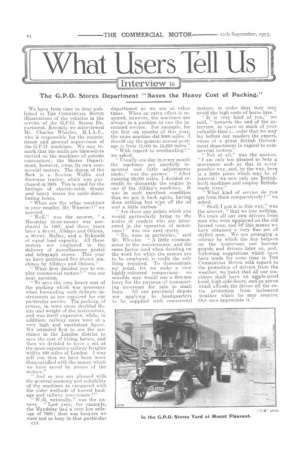pfaxsaav , swzr , , Z , . rfas...iztoargooltar% ti l DterjaM a t a , •
Page 44

If you've noticed an error in this article please click here to report it so we can fix it.
The G.P.O. Stores Department "Saves the Heavy Cost of Packing."
We have from time to time published in THE COMMERCIAL MOTOR illustrations of the vehicles in the service of the G.P.O. Stores Department. Recently we interviewed Mr, Charles Wheeler, M.I.A.E., who is responsible for the maintenance and general supervision of the G.P.O. machines. We may remark that the mails are themselves carried on the machines of outside Contractors; the Stores Department, however, owns its own commercial motors. The doyen of the fleet is a five-ton Wallis and Steev.ens tractor, which was purchased in 1905. This is used for the haulage of electric-cable drums and heavy stores for cable-distributing boxes.
"What are the other machines in your employ, Mr. Wheeler I" we queried.
" Well," was the answer, " a Maudslay three-tonner was purchased in 1907, and three years later a 30-cwt. Andays and,Onions, a 30-cwt. Halley, and a Ryknielcl of equal load capacity. All these motors are employed in the delivery of miscellaneous postal and telegraph stores, This year we have purchased five 20-cwt. machines by Alldays and Onions."
" What first decided you to employ commercial motors?" was our next question.
"To save the very heavy cost of the packing which was necessary when forwar-ding such delicate instruments as are required for our particular service. The packing, of course, in some cases doubled the size and weight of the instruments, and was itself expensive, while, in addition, railway rates were at. a very high and exorbitant figure. We intended first to use the machines in the London district to save the cost, of hiring horses, and then we decided to have a cut at the most expensive railway freights within 100 miles of London. I may tell you that we have been more thanesatisfied with the money which we have saved by means of the motors."
" And so you are pleased with the general economy and reliability of the machines as compared with the older methods of horsed haulage and railway conveyance ? "
"1ST11, naturally," was the answer. "Last year, for example, the 7rIaudslay had a very Tow mileage of 7000; that was because we were not so busy in that particular
c14 department as we are at ether times. When an extra effoit is required, however, the machines are always in a position to run the increased service. For example, for the first six months of this year, the same machine did 9000 miles. I should say the general annual average is from 12,000 to 15,000 miles." "With regard to overhauling ? " we asked.
'Usually one day in every month the. machines are carefully inspected and little adjustments made," was the answer. " After running 22,000 miles, I decided recently to dismantle the engine in one of the Allday's machines. It was in such excellent.. condition that we put it back again, having done nothing but wipe off the oil and a little carbon."
"Are there any points which you would particularly bring to the notice of readers who are interested in the operation of motorvans? " was our next query.
"No, none in particular," said Mr. Wheeler. " A little commonsense in the maintenance, and the same factor used when deciding on the work for which the motors are to be employed, is really the only thing required. To demonstrate my point, let me make a very highly-coloured comparison : no sensible man would use a five-ton lorry for the purpose of transporting ice-cream for sale to small boys. All our provincial depots are applying to headquarters to be supplied with commercial motors, in order that they may avoid the high costs of horse hire." "It is very kind of you," we said, "towards the end of the interview, to spare so much of your valuable time ie order that we may lay before our readers the experiences of a great British Government department in regard to commercial motors."
" Not at all," was the answer. " I am only too pleased to help a .movement such as this in every possible way, and, by the way, here is a. little point which may be of interest : we now only use Britishbuilt machines and employ Britishmade tires."
"What kind of service do you get from them comparatively? " we asked.
" Shall I put it in this way," was the answer, "that we lose nothing. We train all our own drivers from men who were eeaployed on the old horsed vans, and 14 this means we have obtained a very fine set of skilled men. We are arranging a scheme by which the boy helpers on the rootorvans can become guards and drivers later on, and, following suggestions which have been made for some time in THE COMMERCIAL MOTOR with regard tOthe protection of drivers from the weather, we insist that all our machines shall have an ample-sized hood, high side-doors, and anapron which affoltds the driver all the extra protection from inclement weather which he may require. Our men appreciate it."


















































